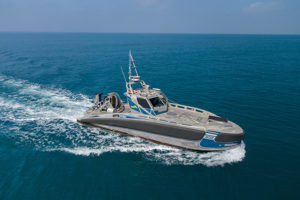Elbit Systems [ESLT] on Monday said its Seagull Unmanned Surface Vehicle (USV) finished a set of anti-submarine warfare (ASW) trials with the United Kingdom Ministry of Defense (MoD) last October.
Elbit’s U.K. business was one of several U.K. companies chosen to take part on the second phase of the MoD’s Defense Science and Technology Laboratory (DSTL) Progeny Framework, which is exploring how autonomous systems could support ASW operations.

Elbit said during the trials the Seagull multi-mission, multi-sensor USV demonstrated its autonomous ASW utility to the MoD using an ‘ASW Toolbox’ solution in a bid to show how it is a force multiplier for ASW operations. Concurrently,
L3Harris Technologies [LHX] provided sonar for the exercise.
While Elbit did not reveal how the ASW mission operates on the Seagull, it said it deters and threatens enemy submarines “using an available asset with significantly lower risk.”
The company said the Seagull has a multi-mission capability and is able to perform ASW, mine countermeasures (MCM), electronic warfare, maritime security, and hydrography missions without changing the vessel, mission control system, or data links. It can be deployed from either a port or mothership, and two vessels can be controlled for the same mission control system in both manned and unmanned modes of operation. Elbit claimed the Seagull has an endurance of four days and a sea-keeping up to Sea-State 5.
The ship’s MCM capability covers end-to-end mine hunting operations like detection, classification, localization, identification, and neutralization of bottom, moored, and drifting sea mines.
“The Seagull USV has once again, demonstrated its superior capabilities underlining Elbit Systems UK’s competitive position to providing innovative and cost-effective solutions to the UK Armed Forces. We are proud of our ongoing work with the Royal Navy as we work together to maintain its operational advantage,” Martin Fausset, CEO of Elbit Systems UK, said in a statement.
DSTL’s Progeny Framework aims to create a community of science and technology suppliers to support current and future maritime research projects. It is worth up to $255 million over eight years. It focuses on unmanned systems, future submarine platforms, and underwater communications and networking.
Previously, Seagull participated in bi-national MCM trials in the North Sea off the coast of Belgium and was deployed by NATO forces in 2018 in a joint ASW exercise with the Royal Navy’s Typoe-45 HMS Duncan and Spanish navy’s Santa Maria-class frigate Victoria.
More recently, in April Elbit said it successfully integrated the Towed Reelable Active Passive Sonar for Unmanned Surface Vehicles on the Seagull during sea trials. That capability allows the vessel to perform ASW operations while “on-the-move,” extending its range and flexibility.